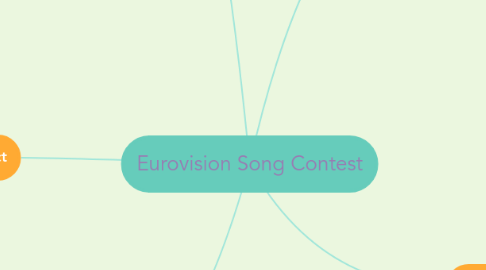
1. Curiosities
1.1. Big 5
1.1.1. Since 2000, Italy, France, Germany, Spain and United Kingdom have automatically qualified for the final, so they are the four biggest financial contributors to the EBU. These countries became known as the "Big Five".
1.2. Languages
1.2.1. Some countries, like Belgium, has sent contestants who sang in a invented language.
1.2.2. English is the most used language in ESC. However, Spanish, Italian, French, Serbian, or Portuguese are familiar in the contest. Actually, the Portuguese song "Amar pelos dois" won this year.
1.3. Barbara Dex Award
1.3.1. The Barbara Dex Award is an annual fan award for the "worst dressed" artist in the Eurovision Song Contest. Barbara Dex was the Belgian participant in 1993.
1.4. Countries
1.4.1. Until 2017, nearly 1,500 songs have taken part in the Eurovision Song Contest.
1.4.2. Norway is the country which has finished in the last place more times: eleven. Nevertheless, Norway has won the contest in three times.
2. Global impact
2.1. TV show
2.1.1. Every year, it's broadcasted in more than 50 countries around the world, like Australia, United States or China. More than 2.000.000 people watch Eurovision Song Contest.
2.1.2. In the last decade, more than 40 countries participate in ESC. Consequently, the EBU decided to implementate two semi-finals since 2004, with the aim to qualify the 26 best songs to the Final.
2.2. AsiaVision
2.2.1. The Asian Broadcaster Union (ABU) has decide to organise a similar contest next year. In this contest, Asian and Oceanian countries will take place.
3. Spain in ESC
3.1. Spain has participated in ESC 57 times, since 1961.
3.2. Its best result was in 1968 and 1969, so Spain finished at first place. On the other hand, Spain has finished last in 5 times.
3.3. Interrupted permonances. In the ESC history, only three times the performances were interrupted. In two of these instances, the entries in question were Spanish representatives.
3.3.1. In 1990, Azucar Moreno opened the contest. The orchestra and the recorded playback began the song out of sync, which caused the singers to miss their cue. The singers left the stage after a few seconds. After that, the music began correctly and the song was performed in full.
3.3.2. Twenty years later, in 2010, the Daniel Diges's performance was interrupted by a notoriuos pitch invader, called Jimmy Jump.
4. History
4.1. Based on the Italian San Remo Music Festival, whereby several countries, represented by their respective broadcasters, would compete in one television show.
4.2. It was created in 1956, in order to improve relations between EBU-member countries, after the Second World War
4.3. Eurovision was firts used by a British journalist to refer the European Broadcaster Union (EBU). However, the contest was created by Marcel Bezençon
5. Contestants
5.1. 50 countries.
5.1.1. Europe
5.1.1.1. All European countries, except Liechtenstein, Kosovo and Vatican City
5.1.2. Asia
5.1.2.1. Israel
5.1.3. Africa
5.1.3.1. Morocco
5.1.4. Oceania
5.1.4.1. Australia
5.2. Victories
5.2.1. 7
5.2.1.1. Ireland
5.2.2. 6
5.2.2.1. Sweden
5.2.3. 5
5.2.3.1. United Kingdom, France and Luxembourg
5.3. Singers
5.3.1. For many singers, ESC was the opportunity to became a famous singers around the world
5.3.1.1. Celine Dion
5.3.1.2. ABBA
5.3.1.3. Julio Iglesias
5.3.1.4. Dana International
5.3.1.5. Katrina and the Waves

